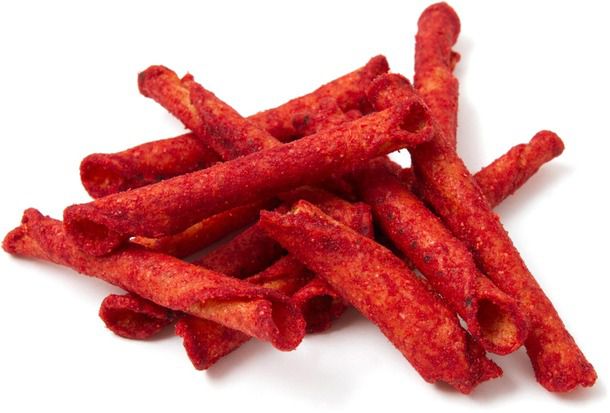Is Takis halal or Not? This question pops up quite a bit among snack lovers who follow halal dietary guidelines. Takis are those spicy, rolled tortilla chips that have taken the snack world by storm. But when it comes to halal, it’s not just about the kick of flavor; it’s about what goes into making those fiery bites comply with Islamic dietary laws.
Understanding halal food isn’t just about avoiding pork or alcohol; it involves investigating every ingredient, how the food is processed, and even how it’s packaged. So, let’s deep dive into the world of Takis. We’ll peel back the layers of spicy seasoning to discover if these popular snacks fit into a halal diet. Whether you’re a long-time fan or just curious about trying them, it’s important to know what you’re munching on. Join us as we explore the halal status of Takis.
What Makes Food Halal?
Wondering what flips the halal switch on food? It’s all about sticking to Islamic dietary laws. Halal isn’t just a label; it’s a lifestyle that affects millions of people worldwide. For food to be halal, it must pass a few important checks.
First up, the ingredients. Everything in the recipe needs to be halal-approved. This means no pork, no alcohol, and no by-products from non-halal animals. Then, there’s the preparation method. The way food is cooked, handled, and even cleaned matters. Even a tiny bit of cross-contamination with non-halal items can change a food’s status.
Finally, certain processes like the slaughtering of animals have strict guidelines. It must be done in a specific, humane way with a prayer recited at the time. This care and respect for life’s end are crucial in halal food preparation.
A Closer Look at Takis
Takis are those vibrant, rolled-up tortilla chips that pack a serious punch of flavor. They’ve become a hit for anyone craving something spicy and crunchy. But what’s the deal with Takis when it comes to being halal? That’s what we’re here to find out.
Takis come in a bunch of bold flavors, like Fuego, Nitro, and Crunchy Fajita. Each flavor brings its own twist, but they all share that signature kick. With such a variety, it’s clear Takis aims to spice up the snack game.

However, the question of halal isn’t just about the spice; it’s about what goes into these fiery treats. Ingredients play a big role in determining if a snack like Takis meets halal standards. And with Takis, there are a lot of ingredients to consider.
Investigating Takis’ Ingredients
So, what’s really in Takis that has everyone asking if they’re halal? Let’s peel back the wrapper and take a closer look at the ingredients that give Takis their fiery reputation.
Takis are known for their bold flavors and vibrant colors. The ingredients list on the back of the packet is where the story starts. From the corn masa flour to the various spices and seasonings, each element plays a part in creating that intense taste. But for our friends in the UK and USA who follow halal dietary guidelines, the focus is on more than just flavor.
Some ingredients raise eyebrows, like artificial colors or flavor enhancers. Are they derived from halal sources? This is crucial because even a small component can affect a product’s halal status. For Takis to be considered halal, every single ingredient must comply with Islamic dietary laws.
Flavorings are another area of interest. Natural and artificial flavorings can come from a variety of sources, some of which might not be halal. The exact nature of these flavorings isn’t always clear from the packaging, leaving those who need to know in a bit of a spicy limbo.
In the end, investigating Takis’ ingredients is about digging into the details. For our snack-loving pals in the UK and USA, knowing what goes into their favorite spicy treat is key to enjoying it without worry. Let’s keep unraveling the mystery of Takis and their halal status.
Diving into the vibrant world of Takis, we uncover a mix of ingredients that bring its bold taste to life. At the heart, we find corn masa flour, treated with lime for that distinct texture. A trio of oils – soybean, palm, and canola – lend the chips their crispy bite.
Seasoned with iodized salt and a sprinkle of sugar, each chip carries a hint of sweetness amidst its spice. The flavor deepens with both natural and artificial tastes, a secret blend that gives Takis their signature kick. Citric acid adds a tangy twist, while soy protein and yeast build on the texture.
Monosodium glutamate, a flavor enhancer, ramps up the umami, paired with maltodextrin for that satisfying mouthfeel. Sodium diacetate introduces a vinegar-like sharpness, complemented by the richness of partially hydrogenated soybean oil.
Color comes into play with artificial dyes like Red 40 Lake and Yellow 6 Lake, painting each chip in vivid hues. Onion powder offers a subtle depth, with hot chili pepper (chile) bringing the heat. Sodium bicarbonate ensures a light, airy crunch, and the blend is kept fresh with silicon dioxide, preventing clumps and keeping each bite as fiery as the last.
This intricate mosaic of ingredients crafts the intense and unforgettable experience of snacking on Takis, igniting taste buds with every crunch.
Also Read: Taco Bell’s Halal Status
Halal Certification Process
When we talk about the halal certification process, it’s like giving food a green light for Muslim consumers. This isn’t just a quick check. It’s a detailed examination to make sure everything, from ingredients to the cooking process, fits halal standards.
First, experts look at the ingredients. They check each one to confirm it’s halal. No shortcuts here. Every detail matters. If there’s pork, alcohol, or any non-halal animal by-product, it’s a no-go.
Next up, the production line. The place where the food is made gets a thorough inspection. The goal? To ensure there’s no cross-contamination with non-halal items. This step is crucial for keeping everything pure and permissible.
Then, there’s monitoring. Halal certification isn’t a one-time deal. Companies must follow halal practices all the time. Regular checks make sure they stay on track.
Is Takis Halal?
Now, the moment we’ve been waiting for: Are Takis halal? Let’s lay out the facts for our friends in the UK and the USA who are keen to know.
After looking at Takis’ ingredients and understanding the halal certification process, here’s the deal. The ingredients in Takis, like corn masa flour, various oils, and seasonings, might seem okay at first glance. But, when we dive deeper, things like artificial flavors and colors, plus the use of monosodium glutamate and partially hydrogenated oils, raise questions.

For a snack to be halal, every single ingredient must pass the test. Plus, the manufacturing process should avoid any chance of cross-contamination with non-halal items. This is where it gets tricky. Without official halal certification, it’s hard to give Takis a clear halal label.
In the UK and the USA, the presence of halal-certified snacks varies. Some brands go the extra mile to get certification, making it easier for Muslim consumers to make informed choices. However, as of now, Takis doesn’t come with a halal certification that covers all their products and flavors.
So, for those wondering if they can enjoy Takis on a halal diet, the answer is a bit complicated. Without official certification, it’s up to individual judgment. Checking the package for a halal label or reaching out to the manufacturer for more detailed information might help in making a decision.
How to Determine if Snacks Are Halal
Figuring out if your favorite snacks are halal can feel like a bit of a detective game. But don’t worry, we’ve got some tips to make it easier for everyone, whether you’re in the UK, the USA, or anywhere else.
First things first, check the packaging. Look for a halal certification mark. This little symbol is your best friend because it means the snack has passed all the checks and is safe to eat on a halal diet.
Next up, dive into the ingredients list. Keep an eye out for any no-nos like alcohol, pork, or by-products from non-halal meat. Remember, some ingredients might have complicated names, so if you’re unsure, a quick online search can clear things up.
Don’t forget about cross-contamination. Even if the ingredients are all halal, if they’re processed on the same equipment as non-halal foods, that could be a problem. If you’re really serious, you can contact the manufacturer to ask about their production process.
Speaking of reaching out, don’t be shy. Many companies are more than happy to answer questions about their products’ halal status. A quick call or email can give you peace of mind before you munch.
Lastly, when in doubt, go for simplicity. Snacks with fewer ingredients are often easier to check for halal compliance. Plus, they’re usually healthier, so it’s a win-win.
FAQs
Can Muslims eat Takis if there’s no halal label?
Without a halal label, Muslim consumers need to review the ingredients list carefully. Look out for any non-halal substances or potential cross-contamination with haram products. When in doubt, consulting a religious authority or opting for a snack with clear halal certification is advisable.
Are there specific Takis flavors that are more likely to be halal?
The halal status of Takis doesn’t necessarily depend on the flavor but rather on the ingredients used in each variety. However, vegetarian flavors might be less likely to contain non-halal ingredients, though it’s still important to check for artificial additives and cross-contamination risks.
Conclusion
Exploring into the spicy saga of Takis, we’ve peeled back each layer to reach the core of our halal inquiry. Despite the zest and zing that make Takis a go-to snack, pinning down their halal status requires a bit more than just a taste test.
Without an official halal certification, Takis sit in a gray area for those following a halal diet. The ingredients list, while revealing, leaves room for uncertainty, especially concerning artificial flavors and potential cross-contamination issues. For our halal-conscious snackers, the path is clear: vigilance is key. Always scan the packaging for that halal mark, dive deep into the ingredients, and when in doubt, reach out directly to the manufacturers. It’s all about making informed choices to ensure your snacks align with your dietary principles.










Leave a reply